- Home
- Diana Wynne Jones
Power of Three Page 9
Power of Three Read online
Page 9
“Deer, in the Northeast … yes, beyond the river … keep to the hills above Otmound.”
Orban looked thoughtful here. He seemed to ask if the Dorig from Otmound were likely to attack the hunt.
“No,” said Ayna. Orban did not look altogether pleased. He wanted to abandon hunting for war if he could. The feeling of oppression and gloom grew so strong on Gair that he wanted to shout out to them not to go.
He fell asleep that night to the sound of Kasta quacking at Orban. In the morning, she had stopped. Orban was looking tired and dismal and Kasta smug.
“I think Ondo’s staying,” Ayna said gloomily. “Lucky Ceri! I wish I could go on the hunt.” Ayna, because of the value of her Gift, was not allowed to hunt very often. Ceri wished his Gifts were that valuable. He did not think himself lucky at all. Three hard days in the open appalled him. He would rather have had Ondo.
“I wish you were going, Gair,” he said dolefully.
Rather than answer, Gair slid away from the bustle of preparation and climbed onto his windowsill again. Scodo and Pad limped among the looms and called jeeringly up at him. Gair ignored them. He looked out at cloud shadows racing on the flat Moor, over to the hazy hills in the North where the deer might be even now. Below him, Miri’s son, Med, who was Beekeeper these days, was kneeling by the hives telling the bees about the hunt and asking them to guard Garholt while it was gone. Behind Gair was bustle, and the clatter of the forges. There was no reason why he should feel depressed. He had been left behind before. Nevertheless, Gair found he just could not bear to stay in Garholt while everyone prepared to go hunting. A little dazzled from watching Sun and clouds, Gair glanced back into the mound. Scodo and Pad had gone. No one was looking at him. Gair swung himself off the sill in a leap which carried him over Med’s head, to land on the hillside just below. There, he waited. You were always polite to bees and their Keeper.
Med looked up and grinned as Gair landed. Med had bees crawling all over him, dark on his arms and legs, gently strolling on his neck and face and whirling round his head. “They were glad to oblige you over Ondo,” Med said, “but they lost a lot of workers over it. So don’t do it again, will you?”
“No,” said Gair. “Tell them I’m sorry.” He was sorry. Bees had died to revenge him.
“And they say the strawberries are ripe by the wood,” Med added cheerfully. “You’ll be first there if you go now.”
By this, Gair knew that the bees had freely forgiven him. He thanked them, and Med, and then went off to the strawberries, largely because Med and the bees would expect him to. But he ate only a few. Five minutes later, he was trotting steadily among the marsh grass, in the direction of the Giants’ pulsing house.
His depression lifted as he trotted. He began thinking of the Giants and wondering who could be plotting to flood the Moor. It must be the Dorig. Dorig lived underwater and ate fish. Giants lived by the land more than people and grew things from it to eat, so it followed that they would not want it underwater. Gair, as he trotted, looked round the bare, cloudswept landscape and saw that it would be easy to fill the Moor with water. All the Dorig need do was to complete the ring of hills with a wall or so and dam up the slow, winding rivers. But, surely, if the Giants knew their plans, they were going to stop the Dorig trying? Gair intended to listen to Giants again and find out what they meant to do.
Or he thought he did, until he came upon the Giant Gerald gloomily wandering in the wood beside the pulsing house. After that, he knew why he had really come. He wanted to know if the Giant was like Ondo, or if, as Ceri had said, he was even more like Gair. Or if—which was the most troubling thought—the Giant resembled both because Gair was like Ondo.
He spent the rest of the morning lurking from tree to bush, watching Gerald and trying to decide. It was not truly difficult. Gerald strode about crushing grass and shaking the earth, his dark face set in a lonely, private look which Gair found very familiar. It was not Ondo’s look. Gair knew it was his own. The Giant did not look happy. Gair wondered why. He wondered, too, if he looked that unhappy himself.
The difficult thing was that the Giant seemed to sense he was being watched. He kept swinging round irritably, and Gair was several times only just quick enough in sliding out of sight. It happened so often that the feeling affected Gair, too. He turned round quickly a number of times, sure that he would catch somebody sliding out of sight—probably Ayna and Ceri again. But there was never anything but a bird, or a gray squirrel clinging to a tree. It became so tiresome that Gair would have gone away, had he not wanted so badly to know why the Giant behaved like Ondo, too.
When the Sun showed midday, Gerald went back to his pulsing house. As Gair could not follow him there, he was forced to trot back to Garholt without having settled the question. Most of the way, he went very briskly, but, as soon as Garholt was in sight, his trot faltered. He dropped to a walk. Finally he stood still, wondering whether to go on to Islaw to see his aunt rather than face the depression he knew was waiting to clutch him in Garholt. He had not felt it yet, but he knew he would. He decided Islaw was too far, if he was to spend the afternoon watching the Giant again. So he braced himself and went to the hive door.
No sooner was the door open than, sure enough, the feeling was there, climbing up out of the walls of Garholt and clutching at Gair. It was more like a solid thing than a feeling. He had to force himself down the steps against it. And when he was down, there was bustle and bad temper and far too many people. Everyone was irritable. Gest was in a very bad humor and Ceri had fallen foul of him.
Gair could not quite understand what had happened, because the trouble appeared to have something to do with himself. No one quite liked to tell him what Gest had said. But Gest had said it, and Ceri had replied. They had yelled at one another.
“Only fancy!” said Miri. “Ceri threatened to put a Thought on his own father! I don’t know what we’re coming to, I really don’t!”
Gest told Ceri he would risk the Thought and asked him which he preferred: a belting, or not going on the hunt. Ceri promptly opted for staying at home. Gest had replied with some well-chosen words about Ceri’s character, and that was that. Ceri was not going hunting either.
When Gair saw Ceri at the eating-square, Ceri looked sulky, but Gair could tell he was thoroughly satisfied. “I don’t know what’s the matter with Father at the moment,” he grumbled, trying to hide a secret smile. “If you say anything, he snaps your head off.”
“Gest has a great deal on his mind,” Adara explained to Gair when Gair went to find her among the stores, “now that there are twice as many people here. And I don’t think Orban is being as helpful as he might. Don’t cross your father.”
Gair’s one wish was to keep out of Gest’s way. There were other things he wanted to say to Adara. “Mother,” he said, “what are the lines of luck from now to next year? Are they good or bad?”
Adara screwed her face up thoughtfully. “I hardly know. Nothing’s clear at the moment. Why?”
“Is it clear for Dorig, or Giants?” Gair asked.
“Ban’s bones!” said Adara. “Let me think. Dorig are clear enough. Their fortunes follow Saturn and the Moon, and both are strong for some time to come. But Giants—Their luck is no clearer than ours. Why?”
Lines of luck were strange and confusing, Gair thought. To look at the Giant Gerald, you would have thought his fortunes followed gloomy Saturn, if ever anyone’s did. He suspected his own did, too. But he had other things to ask about. “Mother, could the Moor ever turn into a lake?”
Adara looked at Gair anxiously. One thing she knew all about was the secret unhappiness that made people ask strange questions. But she did not think Gair had any reason to be unhappy. “The Moor was a lake once,” she said. “When they were enlarging Beckill, they found skeletons of fish, and shells, embedded in the earth— and even stranger things in Islaw. And sometimes, the way the luck lies, the Moor still behaves like water. The Moon draws it. I think that’s why the Dorig
live here. Gair, are you unhappy?”
“Oh no,” said Gair. He did not want to talk about his unreasonable depression, and he was afraid of being led to confess to following a Giant about. “There’s a certain kind of person,” he said hurriedly, “who’s private and lonely and—anyway, why do people think those kind of people are proud? Aren’t they just ordinary?”
“I wouldn’t say they’re ordinary,” Adara said, hoping this got to the seat of Gair’s trouble. “Some people find it more difficult to be easy with other people, and perhaps, if they seem proud, it’s the best they can do. Such people usually have a lot going on inside their heads.”
“I see.” Gair felt his face going red. “Is Ondo that kind of person?”
“Ondo?” Adara said dryly. “I wouldn’t say that was one of Ondo’s troubles. No. Reserve and conceit are rather different things.”
“Thanks,” said Gair, and he dashed away, much comforted.
Adara, as soon as she had finished with the stores, went to try and find him. He had worried her. But by that time Gair was halfway to the Giant’s house, thinking as he trotted that he was in a fair way to becoming a Giant addict.
The Giant was ranging about in the wood again. And now Gair was comforted by what Adara had said, he almost felt he knew him. If he was in doubt about any feeling which crossed the Giant’s gloomy face, he only had to look into his own mind and he knew—or knew more or less. After five minutes of lurking and watching, he discovered that the reason Gerald had been so unpleasant to the Giantess was that Gerald felt the same way about the wood that Gair did about his windowsill. The wood was Gerald’s windowsill—his private place—but, being a Giant, Gerald needed a larger place than Gair did. He was jealous of it and, as he had done in the morning, he kept turning round to make sure he was alone.
Gair caught the feeling, just as he had done in the morning. He had a notion that it had something to do with the pulsing house. He could feel it, at the corner of his mind, queerly shifting from ugly to lovely just beyond the wood. It made him uneasy. He kept needing to turn his head.
One time he turned, he found the old mild dog had ambled into the wood out of the Sun. When Gair saw it, it was amiably staring at a gray squirrel, which was clinging halfway up a tree trunk, obviously not at all scared by the dog. Gair softly spoke the words and the dog came amiably to him. He made a fuss of it. It was so old and so good-humored that he wondered again what possible use it could be to the Giants.
The Giant saw the dog and called to it. But the dog was enjoying Gair scratching its chin and did not bother to move.
The next second, the Giant was crashing among the trees toward Gair. “Tober! Tober, come here!”
Gair let go of the dog, slid round a tree and flattened himself against it. He was terrified. All he had been told about the ruthlessness of Giants, all he had discovered about their strength and violence, made his heart bang and his stomach turn. If the Giant found him in his private place—! But he wanted to know Gerald. He yearned to talk to him. He was the only being Gair knew with whom he had anything in common. But he dared not move.
“My father could do it!” Gair told himself angrily. “Why can’t I?”
He stayed flattened against the tree while Gerald trampled up and took the dog away.
Later, Gair returned slowly and moodily to Garholt. He was ashamed of his failure. He was also dreading the feeling he knew would meet him as soon as he went inside the mound.
But the feeling took him by surprise by climbing out of Garholt and seizing him by the throat before he had reached the gate. It took Gair and shook him. It was like a great living creature. Gair choked and almost fell over. “What is it?” he said. “Stop it, can’t you?” It made no difference. The feeling clenched itself on Gair’s neck and seemed to wrap itself round his shoulders. But it was all round, too. Gair had to fight his way into the mound against it, and, inside, it was even worse. It made Gair want to shout things, peculiar things. He went down the steps very slowly, biting his teeth together, determined not to open his mouth except to eat. He knew it was going to force him to say something stupid if he gave in to it for a moment.
Garholt was quiet and businesslike by this time. All the preparations for hunting were made. Those who were going were ready to eat supper and be off. The only one bustling was Kasta. Since Ondo was still in bed, wringing the last drop out of his injuries, Kasta was free to fuss noisily round Orban, to remember this, recall that and generally make a stir.
“Must draw attention to herself, that one!” Miri said savagely. Then she looked at Gair’s face. “What’s the matter? Where have you been?”
“Gair, what is it?” said Adara.
“Nothing,” said Gair, and bit his teeth together again. Miri and Adara looked at him so anxiously that Gair wondered what was the matter with his face. But he dared not ask, for fear the feeling made him say something insane. It kept forcing at him and forcing at him, jabbing him with horror, racking him with anxiety, trying to make him shout out nonsense, so that he had to resist it all the time.
Over supper, Gest gave Adara instructions about what to do while the hunt was gone. Everything he said seemed to make Gair’s feeling worse. “Don’t trouble with the building,” he said. “Unless the old men want to do the carpentry. And be careful of strangers—don’t let them know we’re all away. Will you need to send any parties out of the mound?”
“Yes. The strawberries should be ripe,” said Adara. “I was going to send the children, with Gair for a guard.”
Gest looked at Gair, who was listening with his head bent and his teeth clenched against the feeling. “Hm,” he said. “But do make sure—”
Kasta turned from sending Fandi to Ondo with a plover’s egg. “No need to worry, Gest,” she said. “I’ll be in charge.”
Gest looked at her as if he could not believe his ears. “In charge?”
Kasta wriggled and gave a preening sort of smile. “Of course. I am the senior wife, after all.”
“You!” said Gest.
“Now, Gest,” said Orban. “We can settle this reasonably.”
“NO WE CANNOT!” said Gest. “I give orders in Garholt. Not you, and certainly not Kasta. Is that clear?”
“Well, I—” said Orban.
“Don’t be ridiculous, Gest!” said Kasta. “You can’t pass over me for Adara, when my experience—” The quacking noise was in her voice. Everyone sighed.
“Shut up!” said Gest. Kasta stopped, with her mouth open, outraged. “No amount of noise from you,” said Gest, “is going to make any difference. Adara is in charge while I’m gone. If you don’t like it, you can come on the hunt, too. Now hold your tongue!”
Kasta’s face twisted with rage. She opened her mouth again, to point out that she was far too important to go hunting. Gest stared at her, daring her to say another word. And, to everyone’s surprise, Kasta slowly shut her mouth again. There was an uneasy, admiring silence, which grew longer and longer, as everyone realized Gest had actually worsted Kasta.
To Gair, it was unbearable. The feeling grabbed him in the silence, and squeezed and squeezed, forced at his throat and squashed words out of him before he could stop it.
“Don’t go hunting,” he said. “Please. Don’t any of you go.”
Everyone at the eating-square turned and stared at him. Orban’s eyebrows went up; Fandi tittered. Gest looked exasperated.
“Why did you say that, Gair?” Adara asked quickly.
Gair had no idea, except that he had been unable to stop. He felt ashamed and stupid. All he could do was shake his head. He dared not speak.
“Poor little soul!” Kasta said maliciously. “He’s overwrought!”
She could have said nothing better calculated to annoy Gest. He looked coldly from Gair’s shamed face to Ceri’s puzzled one. “I seem to have fathered a rare couple of ninnies,” he said, and for the rest of supper he pointedly talked only to Ayna and Adara.
The people going on the hunt were muster
ing by the main gate. Gest got up to join them. The feeling rushed at Gair so fiercely that it was all he could do not to shout out.
Orban said, “Won’t be a moment,” and hurried into the house.
He was gone some time. The muster by the main gate grew, and was surrounded by ladies tightening buckles and reminding their relatives that they had spare socks in their bag and the green blanket was waterproof. Gest became impatient. Kasta ran about wondering what Orban was doing.
Orban came out of the house towing Ondo. Ondo was dressed, and very sulky indeed. There was not a sign of a bee sting on him, except for a small purple blotch on one cheek, but Kasta screamed at the sight of him, and wrung her hands.
Ondo liked hunting even less than Ceri. He took instant advantage of it. “I’m not well enough, Mother! Don’t let him make me go hunting!”
“Of course you mustn’t, darling! Orban—!” quacked Kasta.
Orban took no notice. He nodded to Adara, and Adara brought out Ondo’s hunting-bag, ready packed, his blanket, his weapons and his belt. Ondo protested that he felt ghastly. Kasta, finding Orban and Adara had gone behind her back, shot them venomous looks, and pursued Orban as he dragged the miserable Ondo over to the gate, quacking like a whole flight of ducks. Fandi pursued Kasta, rather put out to find that even the Otmounders were trying not to laugh.
“Serve them both right!” said Miri, and hastened to see that Med was properly equipped.
“Let’s go and say good-by,” Adara said to Ayna, Ceri and Gair.
Gair would much rather not have gone. He knew it would look stupid and sulky not to say good-by, but the feeling was now so strong that he could only resist it by bracing his legs and clenching his teeth and standing where he was.
They went over to the gate. The feeling tried to push Gair there ahead of the others. He had to lean against it to stay beside them. And once they were among the hunters, it was worse than ever. Through a sort of haze of horror, Gair saw Miri embarrassing Med by repacking his socks; Banot joking with Tille as they did a last-minute repair on Brad’s spear-lashing; Dari’s little sisters presenting her with a lucky flint; Gest smiling cheerfully at Adara; and Orban firmly buckling equipment onto the sullen Ondo. The feeling beat at Gair and shook him, and he dared not open his mouth.

 Fire and Hemlock
Fire and Hemlock Reflections: On the Magic of Writing
Reflections: On the Magic of Writing The Game
The Game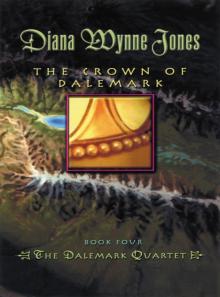 The Crown of Dalemark
The Crown of Dalemark Deep Secret
Deep Secret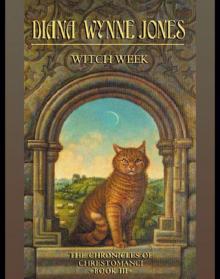 Witch Week
Witch Week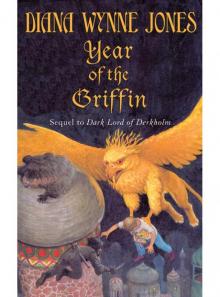 Year of the Griffin
Year of the Griffin Wild Robert
Wild Robert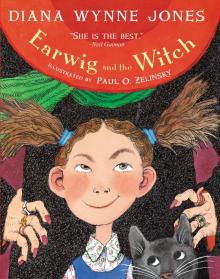 Earwig and the Witch
Earwig and the Witch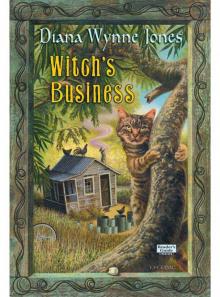 Witch's Business
Witch's Business Dogsbody
Dogsbody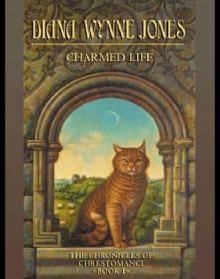 Caribbean Cruising
Caribbean Cruising Cart and Cwidder
Cart and Cwidder Conrad's Fate
Conrad's Fate Howl's Moving Castle
Howl's Moving Castle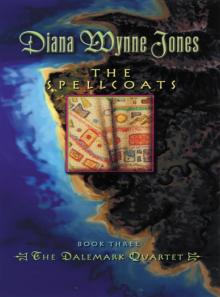 The Spellcoats
The Spellcoats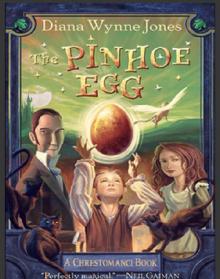 The Pinhoe Egg
The Pinhoe Egg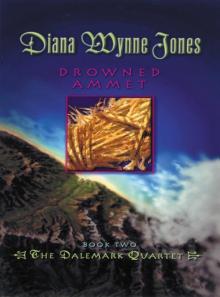 Drowned Ammet
Drowned Ammet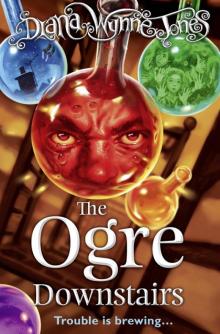 The Ogre Downstairs
The Ogre Downstairs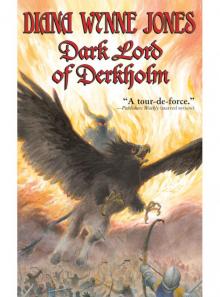 Dark Lord of Derkholm
Dark Lord of Derkholm Castle in the Air
Castle in the Air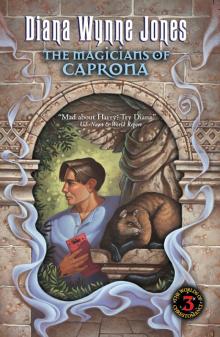 The Magicians of Caprona
The Magicians of Caprona A Tale of Time City
A Tale of Time City The Lives of Christopher Chant
The Lives of Christopher Chant The Magicians of Caprona (UK)
The Magicians of Caprona (UK)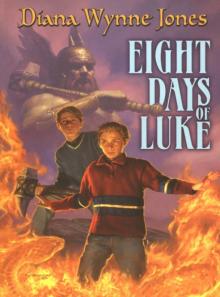 Eight Days of Luke
Eight Days of Luke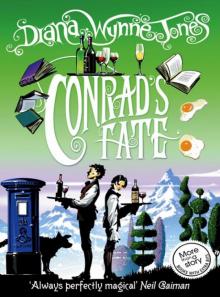 Conrad's Fate (UK)
Conrad's Fate (UK) A Sudden Wild Magic
A Sudden Wild Magic Mixed Magics (UK)
Mixed Magics (UK)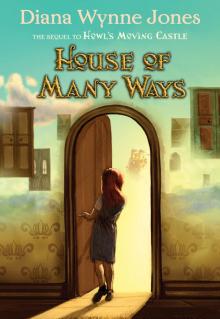 House of Many Ways
House of Many Ways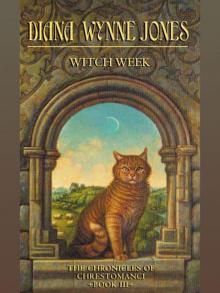 Witch Week (UK)
Witch Week (UK) The Homeward Bounders
The Homeward Bounders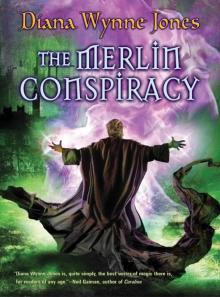 The Merlin Conspiracy
The Merlin Conspiracy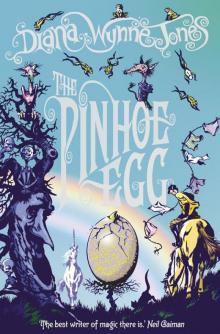 The Pinhoe Egg (UK)
The Pinhoe Egg (UK)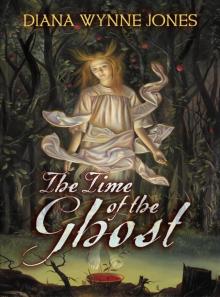 The Time of the Ghost
The Time of the Ghost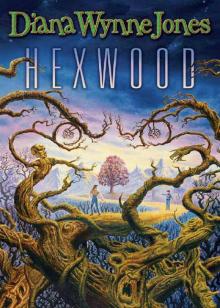 Hexwood
Hexwood Enchanted Glass
Enchanted Glass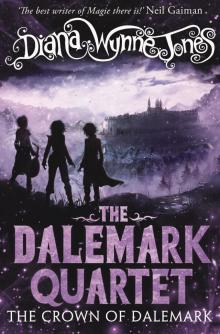 The Crown of Dalemark (UK)
The Crown of Dalemark (UK)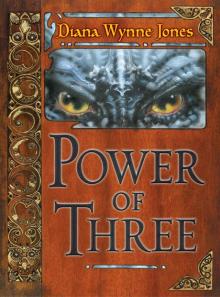 Power of Three
Power of Three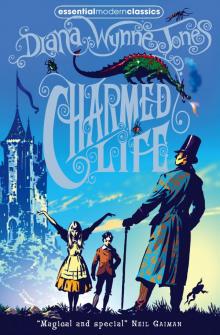 Charmed Life (UK)
Charmed Life (UK)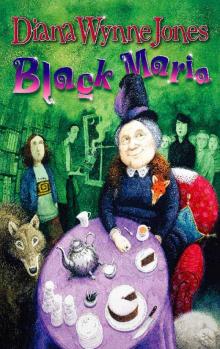 Black Maria
Black Maria The Islands of Chaldea
The Islands of Chaldea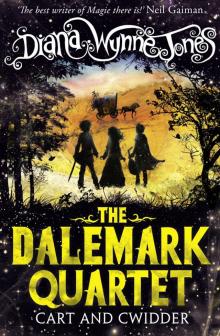 Cart and Cwidder (UK)
Cart and Cwidder (UK)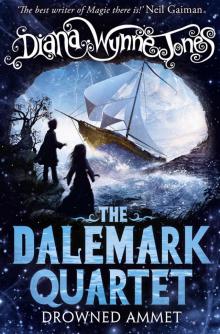 Drowned Ammet (UK)
Drowned Ammet (UK)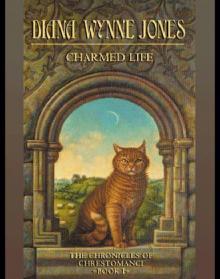 Charmed Life
Charmed Life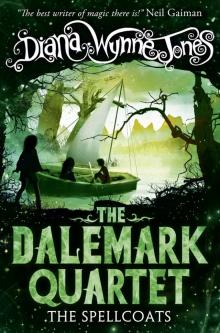 The Spellcoats (UK)
The Spellcoats (UK)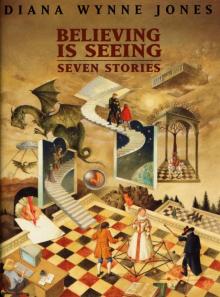 Believing Is Seeing
Believing Is Seeing Samantha's Diary
Samantha's Diary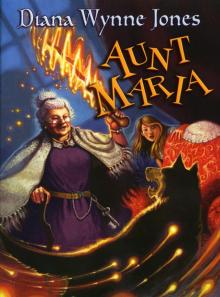 Aunt Maria
Aunt Maria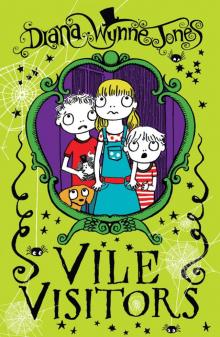 Vile Visitors
Vile Visitors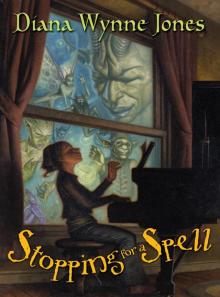 Stopping for a Spell
Stopping for a Spell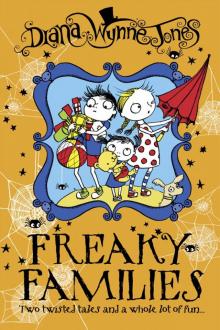 Freaky Families
Freaky Families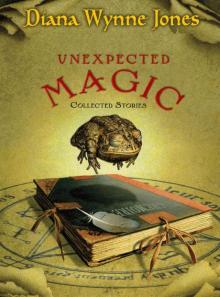 Unexpected Magic
Unexpected Magic Reflections
Reflections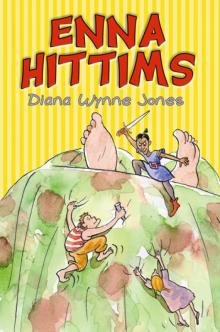 Enna Hittms
Enna Hittms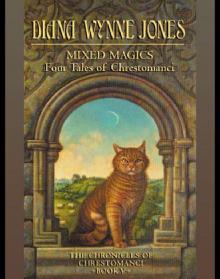 Mixed Magics: Four Tales of Chrestomanci
Mixed Magics: Four Tales of Chrestomanci